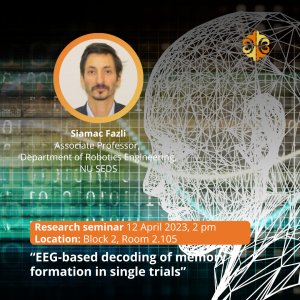NU SEDS Research Seminar “EEG-based decoding of memory formation in single trials” by Associate Professor Siamac Fazli
Nazarbayev university
53 Kabanbay str

Nazarbayev University School of Engineering and Digital Sciences (NU SEDS) and National Laboratory Astana (NLA) invite you to attend the research seminar “EEG-based decoding of memory formation in single trials” by Associate Professor Siamac Fazli, Department of Robotics Engineering, NU SEDS.
Date: April 12, 2023, Wednesday
Time: 2 pm
Location: Block 2, Room 2.105
Siamac Fazli received the BSc degree in physics from the University of Exeter, Exeter, U.K., in 2002, the MSc degree in medical neurosciences from the Humboldt University of Berlin, Berlin, Germany, in 2004, and the PhD degree from the Berlin Institute of Technology, Berlin, in 2011. From 2011 to 2013, he was a Post-Doctoral Researcher with the Berlin Institute of Technology, Bernstein Focus Neurotechnology. In 2013, he was appointed as an Assistant Professor with Korea University, Seoul, South Korea. From 2016 to 2017, he worked as a Group Leader with the Fraunhofer Institute for Telecommunications, Berlin. In 2018, he joined the Computer Science Department at Nazarbayev University, as an Associate Professor. His current research interests include machine learning, biomedical engineering and computational chemistry.
ABSTRACT: While EEG-baed decoding plays an important role in deciphering brain-states, the vast majority of applications have been proposed for rehabilitation purposes. Here we will discuss a novel application that has only recently emerged, namely neural-assisted learning. In particular we examine whether neuroimaging in combination with modern machine learning is able to i) detect differences between brain signals for subsequently remembered and forgotten items during declarative memory formation; ii) whether single trial prediction of memorization success is possible and iii) to validate these findings in an application-oriented context involving longer test spans with realistic learning materials encompassing more items.



